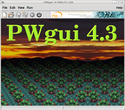________________________________________________________________________
*** INSTALLATION instructions for PWgui ***
________________________________________________________________________
The PWgui package comes in two flavors:
(i) STANDALONE EXECUTABLE, which runs out of the box (but works
only on the platform for which it has been built)
(ii) SOURCE PACKAGE
N.B.: for the usage of repository version of PWgui see file INSTALL.repository
________________________________________________________________________
(i) Installation instructions for STANDALONE EXECUTABLE
________________________________________________________________________
For zipped pwgui-xxx.zip package do:
* unzip pwgui-xxx.zip
whereas for tar-gzipped pwgui-xxx.tgz package do either:
* tar zxvf pwgui-xxx.tgz
or:
* gunzip -c pwgui-xxx.tgz | tar xvf -
To launch the program type either:
* ./pwgui
or
* pwgui
The standalone executable is always available for Linux platform, and
occasionally also for Mac and Windows.
________________________________________________________________________
(ii) Installation instructions for SOURCE PACKAGE
________________________________________________________________________
To use the source package you need the required Tcl software, in
particular Tcl + Tk + Itcl + Itk + Iwidgets. PWgui requires the Tcl/Tk
version 8.4 or later. You may install the software from your OS
distribution.
For example, for GNU/Linux Debian-based distributions, execute as root
(or sudo):
* apt-get update; apt-get install iwidgets4
(this will install also tcl/tk/itcl/itk, because iwidgets depend on them).
On fedora-based distributions, the analogous command is "dnf". Hence:
* dnf install iwidgets
Once your computer has all the needed software, your source package is
ready to run. You only need to untar the PWgui source tarball, i.e.:
* tar zxvf PWgui-xxx.tgz
or
* gunzip -c PWgui-xxx.tgz | tar xvf -
where xxx stands for the version number. To launch the PWgui program,
type: pwgui.
You may add the PWgui root directory to your PATH.
If you would like to copy "pwgui" launcher to some common place, such
as /usr/local/bin or /opt/bin, then you need to define the PWGUI
environmental variable so that "pwgui" will be able to locate its root
directory (i.e. source files).

